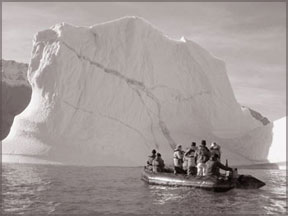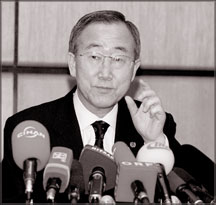 Low faith in biofuels for climate
by Richard Black
Decision-makers in the climate change field have little faith in
biofuels as a low-carbon technology, the World Conservation Union (IUCN)
has found.
Unveiled at the UN climate convention meeting in Bali, its survey
shows professionals have more confidence in bicycles than in biofuels.

The findings come as ministers assemble for the final part of the UN
talks.
Conservation groups have highlighted the impact of climate change in
the tropics and the Antarctic.
European negotiators at the two-week meeting in the beach resort of
Nusa Dua are hoping that the meeting will launch a two-year process
leading to a further round of binding cuts in greenhouse gas emissions,
to come into force when the current Kyoto Protocol targets expire in
2012.
But delegates say much ground remains to be covered as ministers from
nearly 190 nations arrive for the last three days of discussions under
the UN climate convention (UNFCCC) and Kyoto Protocol.
Fuelling doubts
"Technology must be at the heart of the future response to climate
change," UNFCCC Executive Secretary Yvo de Boer declared at the talks.

But which technology? In a survey of 1,000 professionals in 105
countries, IUCN attempted to gauge which technologies inspire the most
confidence.
The survey included people from governments, NGOs and industry.
Of 18 technologies suggested by IUCN, the current generation of
biofuels came bottom of the list, with only 21% believing in its
potential to "lower overall carbon levels in the atmosphere without
unacceptable side effects" over the next 25 years.
Nearly twice as many were confident in the potential of nuclear
energy while solar power for hot water and electricity emerged as the
most favoured low-carbon technologies.
Life at the extremes
Overall, respondents said increasing energy efficiency and reducing
demand could produce more benefits than "clean" energy sources.
Although the EU and the US are attempting to boost the expansion of
biofuels, recent evidence is equivocal about their potential.
Studies show they may produce only marginal carbon savings compared
to conventional petrol and diesel.
In Indonesia and elsewhere, forests are being cleared for palm oil
plantations, partly to produce biofuels.
There is evidence that leaving forests intact results in greater
climate benefits while protecting biodiversity.
Two presentations on the sidelines of the Bali conference have
highlighted the impacts of climate change on the natural world.
Conservation International (CI) researchers took forecasts from the
the Intergovernmental Panel on Climate Change's (IPCC) 2007 assessment
of the Earth's likely climatic future, and calculated what those
forecast trends would mean for areas safeguarded for nature, such as
national parks and forest reserves.
They found that more than half of these zones are vulnerable to
projected climate change. In 21 countries, mainly in the tropics, more
than 90% of protected areas are vulnerable.
"We previously assumed that if the land is protected, then the plants
and animals living there will persist," said Sandy Andelman, head of
CI's Tropical Ecology Assessment and Monitoring network.
"That may be wishful thinking."
WWF, meanwhile, looked at conditions at the Earth's other climatic
extreme - the cold of the Antarctic peninsula.
This tendril of land that projects from the Antarctic towards the tip
of South America is warming much faster than the global average.
According to WWF researchers, sea ice cover has declined by about 40%
over the last quarter century.
"The research done over the last couple of years is that many penguin
populations across Antarctica are in decline, with some dropping as much
as 65%," said WWF's director-general Jim Leape.
"You are seeing a massive loss of sea ice in important parts of the
continent, and that sea ice is crucial to the food web of Antarctica
upon which these penguins depend."
Binding ties
Like other conservation groups, WWF is calling for the inclusion of
binding targets for reducing carbon emissions in any agreement coming
out of the Bali conference. A draft circulating this week calls for
industrialised nations to cut their emissions by 25-40% by 2020.
It is supported by the EU. But the US, Australia, Canada and Japan
are arguing against the inclusion of concrete targets at this stage.
"To start with a predetermined answer, we don't think is an
appropriate thing to do," US chief negotiator Harlan Watson has said.
But there is frustration among some developing countries at what they
see as a lack of political will among the high emitters.
"If nobody shows the willingness to deal with the reduction of carbon
emissions to a manageable level, then what are we doing here?" Brazilian
delegate Thelma Krug told the AFP news agency.
Receiving the Nobel Peace Prize in Oslo , former US Vice-President Al
Gore urged the US and China to "stop using the others' behaviour as an
excuse for stalemate" and work together to find a mutually acceptable
way of tackling climate change.
Mr Gore and his fellow Nobel laureate, IPCC chairman Rajendra
Pachauri, will be in Bali for the ministerial talks, as will the new
Australian Prime Minister Kevin Rudd whose recent ratification of the
Kyoto Protocol injected fresh optimism into the UN process.
But three days of busy talks lie ahead if a deal is to be made.
BBC
Penguins now threatened by global warming
by Paul Eccleston
Global warming is threatening one of the most endearing symbols of
Antarctica - the penguin.
Four species of penguin are facing a dual threat from loss of nesting
sites and a shortage of food.
|

One of the oldest houses in the country |
The environmental conservation group WWF is warning that rising
temperatures and the resulting loss of sea ice is robbing the emblematic
birds of the nesting grounds they need to breed successfully.
At the same time climate change and over-fishing has led to a
reduction in the availability of krill - tiny crustaceans - which they
rely on for food.
The most vulnerable of the four species at risk is the biggest, the
Emperor, renowned for the stoic male which nurses its solitary egg on
its feet throughout the long Antarctic winter when temperatures can drop
to almost -50§C.
All four species - the others are Gentoo, Chinstrap, and Ad‚lie -
have suffered dramatic drops in population, according to the Antarctic
Penguins and Climate Change report.
Global warming is happening much more quickly in some parts of the
continent, particularly the north-west area of the continent known as
the Antarctic Peninsula, where in the last 50 years temperatures have
risen by about 2.5§C - as much as five times the world average.
The Southern Ocean has also warmed all the way down to a depth of
3,000m. In this area, an important breeding area for the penguins, sea
ice has been forming later and receding earlier and covering a smaller
average area each winter.
Sea ice now covers 40 per cent less area than it did 26 years ago off
the West Antarctic Peninsula.
Krill and fish that normally live around sea ice have been decreasing
and numbers may have declined by as much as 80 per cent since the 1970s.
Many scientists believe that the fate of sea ice and its relationship to
the food chain holds the key to the survival chances of many species in
Antarctica.
Emily Lewis-Brown, Marine and Climate Change Officer at WWF-UK. said:
"As the ice melts, these icons of the Antarctic will have to face an
extremely tough battle to survive.
"One of the coldest environments in the world is actually seeing some
of the fastest rates of global warming, and unless action is taken to
reduce global CO2 emissions, the future of many Antarctic species looks
bleak."
The majestic Emperor has seen some of its colonies halved in size
over the past half century. Warmer winter temperatures and stronger
winds have forced the penguins to raise their chicks on increasingly
thinner sea ice. For many years sea ice has broken off early and many
eggs and chicks have been blown away before they were ready to survive
on their own.
Populations of Ad‚lie have dropped by 65 per cent over the past 25
years in the Antarctic Peninsula as temperatures have risen
It has had to contend not only with a shortage of food with the
disappearance of sea ice, but its cousins, the Gentoos and Chinstraps
have ironically taken advantage of the warmer temperatures and invaded
its territory.
Scientists fear for the Ad‚lie because it needs land that is free of
snow and ice to raise its young. The warmer temperatures have resulted
in more moisture in the atmosphere resulting in more frequent and
heavier snowfalls.
But some colonies of Chinstraps have also seen reductions in numbers
of up to two thirds because the shortage of food has made it more
difficult for its to survive.
The Gentoo has also seen its numbers fall because they are becoming
increasingly dependent on krill for food as other sources have been
depleted by overfishing.
Emily Lewis-Brown said: "The UN climate change summit underway in
Bali must agree a process now which results in comprehensive, ambitious,
and fair global emission reduction targets beyond the current phase of
Kyoto which ends in 2012. It's vital that governments agree upon a
clear, shared vision to keep global warming to less than 2øC above
pre-industrial levels."
The charity also wants to see international action to protect
Antarctica from other pressures such as fisheries and tourism.
Telegraph, UK
EU criticises Israel settler plan
A senior EU official has criticised an Israeli decision to build more
houses in occupied East Jerusalem, joining the US in condemning Israel.
External Relations Commissioner Benita Ferrero-Waldner said she was
"very concerned" about a plan for 300 new homes on land captured in the
1967 war. "We want to have a successful peace process," Ms
Ferrero-Waldner said.
In rare condemnation by the US, the secretary of state said it
threatened new Israeli-Palestinian talks.
Benita Ferrero-Waldner, the former Austrian foreign minister, was
speaking after talks with Palestinian Authority Prime Minister Salam
Fayyad in Brussels. Mr Fayyad said the fresh settlement activity was
against "the letter and the spirit" of the recent Arab-Israeli peace
conference.
"Those actions are clearly inconsistent with the overall direction
this process should take if it is to produce an outcome that is
satisfactory to all; lasting peace in the Middle East," he said.
Obligations
He said the Palestinian Authority would seek $5.6bn (œ2.7bn) in aid
for 2008-10 at a donors' conference next week in Paris.
The first face-to-face meeting after last month's Annapolis summit is
due to take place on Wednesday.
Under obligations contained in the international peace plan known as
the roadmap, agreed in 2003 and revived in 2007, Israel must cease
settlement activity on occupied land.
However, Israel says the restriction does not apply in East
Jerusalem, which it annexed in 1967. The annexation has not been
recognised internationally.
Secretary of State Condoleezza Rice said the plan "doesn't help build
confidence", after meeting Israeli Foreign Minister Tzipi Livni in
Brussels on Friday.
The new units will be built at Har Homa settlement, which already has
about 2,000 houses, in an area of south-east Jerusalem known to
Palestinians as Jabal Abu Ghneim.
BBC
Algiers bomb shatters UN office
The UN has confirmed 10 of its staff died in a double car bombing in
the Algerian capital, Algiers, which killed at least 26 people and
injured 177.
Medics believe up to 62 people died when the devices went off,
shearing the facade off the UN refugee agency and hitting a government
building.
|

One of the oldest houses in the country |
Secretary General Ban Ki-moon called the worst attack on the UN since
2003 "an abjectly, cowardly strike".
Al-Qaeda's North Africa wing claimed responsibility on an Islamist
website.
Algerian television has reported that six people were pulled alive
from the ruins of the UN offices.
Missing staff
"We now believe that the UN death toll is at 10," said UN spokeswoman
Marie Okabe, adding that "a number of staff" were still missing.
The neighbouring office of the UN Development Programme was also
damaged when the first car bomb went off at around 0930 (0830 GMT).
It was the deadliest attack on the UN since militants bombed its
offices in Baghdad, Iraq, in 2003, killing 22 people.
At around the same time, an explosion ripped into a bus packed with
students outside
Algeria's Constitutional Council in the Ben Aknoun district.
The body rules on the constitutionality of laws and supervises
elections.
In an unverified online statement, a group calling itself al-Qaeda in
the Land of the
Islamic Maghreb said two vehicles packed with 800kg (1,700lb) of
explosives each were used in the blasts.
The group labelled the UN buildings an "international infidels' den"
and said it had carried out the attacks to honour one of its senior
militants, who died fighting Algerian troops.
It called on Western leaders to "heed the demands of al-Qaeda leader
Osama Bin Laden".
UN High Commissioner for Refugees (UNHCR) Antonio Guterres said his
office was "of course a target for those that have a completely nihilist
vision of today's world". Algerian Interior Minister Yazid Zerhouni
confirmed a suicide bomber was behind the blast which hit the UN
offices.
The UN secretary general led international condemnation of the
attacks.
"This was an abjectly cowardly strike against civilian officials
serving humanity's highest ideals," he said.
Violence upsurge
US President George W Bush condemned the attack "by these enemies of
humanity" and French President Nicolas Sarkozy called the bombings
"barbaric and cowardly".
Algerian Prime Minister Abdelaziz Belkhadem, who visited the injured
in hospitals, said nothing could "justify the crime".
There have been a series of bomb attacks across Algeria during the
past year in which scores of people have died.
In September more than 50 people were killed in suicide attacks - one
of them involved a truck packed with explosives being driven into a
coast-guard base.
Members of the public have recently held rallies in protest at the
upsurge in violence. Many of the recent blasts were also claimed by
al-Qaeda in the Land of the Islamic Maghreb (AQLIM), including a triple
suicide bombing in Algiers in April which killed 33 people.
Algeria suffered a brutal and bloody civil war in the 1990s, but in
recent years violence had declined.
BBC
UN chief warns Myanmar
U.N. Secretary General Ban Ki-moon warned Myanmar the international
community was running out of patience with its authoritarian regime,
saying Monday the junta must embrace democracy and stop inflicting
suffering on its own people.
"I know the international community is very much impatient, and our
patience is running out," Ban told a news conference in Bangkok,
Thailand.

"The people of Myanmar have suffered from isolation for such a long
time and it's high time now that the Myanmar authorities and the people
... enjoy democracy and freedom."
A U.N. human rights envoy said Friday that Myanmar's crackdown on
pro-democracy protesters in September killed at least 31 people, twice
the toll acknowledged by the junta.
The envoy, Paulo Sergio Pinheiro, also said that 650 people remained
in custody from the crackdown and another 74 people were missing.
The United Nations and governments around the world expressed outrage
after the junta's troops opened fire on pro-democracy protests, which
were led by Buddhist monks. Rights groups have reported continued
arrests and abuse, despite claims by the junta that the crackdown has
stopped.
"I would like to emphasize that the return to statue quo is not
acceptable, and is politically unsustainable," Ban said.
He appealed to the 10-nation Association of Southeast Asian Nations
to play a special role in pushing Myanmar -- one of its members --
toward democratic reforms.
"We need ASEAN's special cooperation," Ban said. "ASEAN has a special
political responsibility in promoting further democratization."
ASEAN, which has a stance of not interfering with its members'
domestic affairs, has been criticized for not doing enough to pressure
Myanmar's military leaders.
Ibrahim Gambari, the U.N.'s special envoy to Myanmar, has toured
Southeast Asian countries in recent weeks but failed to get any
governments to take a strong public line against their neighbor.
AP |
